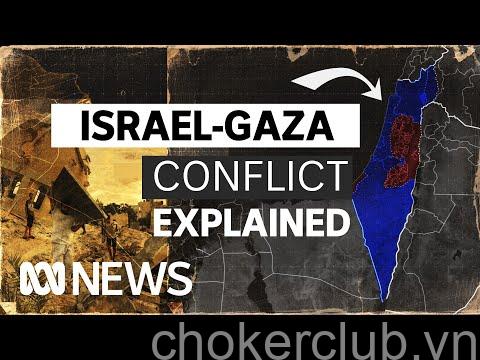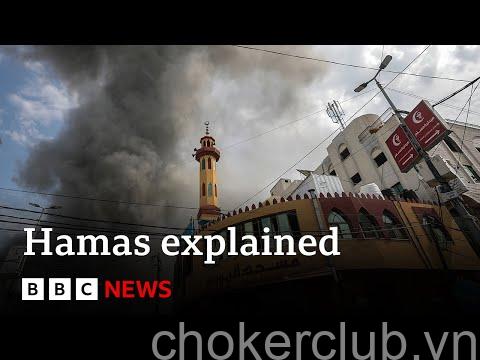What Is Hamas? Understanding the Palestinian Islamist Movement
Hamas, also known as the Islamic Resistance Movement, is a Palestinian nationalist and Islamist militant organization that governs the Gaza Strip. In this article, we will delve into what Hamas is and explore its origins, ideological foundations, role in the Israeli-Palestinian conflict, governance of the Gaza Strip, and use of armed resistance. Additionally, we will examine international perspectives on Hamas, including its designation as a terrorist organization. Gain a comprehensive understanding of what Hamas represents and its impact on the region. Welcome to Chokerclub‘s exploration of “what is hamas?”

| Key Takeaways |
|---|
| Hamas is a Palestinian nationalist and Islamist militant organization. |
| It governs the Gaza Strip and emerged from an Islamic charity involved with the Muslim Brotherhood. |
| Hamas opposes the Israel-PLO Letters of Mutual Recognition and the Oslo Accords. |
| The group is committed to armed resistance against Israel and the creation of an Islamic Palestinian state. |
| Hamas has fought four wars against Israel since taking power in Gaza in 2007. |
| It is designated as a terrorist organization by multiple countries. |
The Origins of Hamas and Its Ideological Foundations
Formation of Hamas
Hamas, an acronym for “Islamic Resistance Movement,” was founded in 1987 by Palestinian imam and activist Ahmed Yassin. It emerged from his previous organization, Mujama al-Islamiya, which was established in Gaza in 1973 as an Islamic charity associated with the Muslim Brotherhood. Hamas gained prominence during the first Palestinian intifada, or uprising, against Israel’s occupation of the West Bank and Gaza Strip.
Ideological Foundations
Hamas is rooted in a combination of Palestinian nationalism and Islamist ideology. It seeks to establish an Islamic Palestinian state in place of Israel and rejects the two-state solution. The group’s charter emphasizes armed resistance as a means to achieve its goals and rejects any recognition of Israel’s right to exist. Hamas draws inspiration from Islamic scriptures and principles, viewing the conflict with Israel as a religious struggle for liberation.
Key Points:
- Hamas was founded in 1987 by Ahmed Yassin.
- It emerged from the Islamic charity Mujama al-Islamiya.
- Hamas combines Palestinian nationalism with Islamist ideology.
- The group rejects the two-state solution and emphasizes armed resistance.
Table: Hamas’ Ideological Foundations
| Ideological Elements | Description |
|---|---|
| Palestinian Nationalism | Hamas seeks to establish an independent Palestinian state. |
| Islamist Ideology | Hamas draws inspiration from Islamic principles and scriptures. |
| Rejection of Two-State Solution | Hamas opposes the idea of coexistence with Israel. |
| Emphasis on Armed Resistance | Hamas believes in using force to achieve its objectives. |

Hamas’ Role in the Israeli-Palestinian Conflict
Opposition to Peace Accords
Hamas has been a vocal opponent of peace accords between Israel and the Palestinian Authority. It opposed the Israel-PLO Letters of Mutual Recognition and the Oslo Accords, which aimed to establish a framework for peace and a two-state solution. Hamas rejects any recognition of Israel’s right to exist and believes that armed resistance is the only way to achieve Palestinian liberation.
Engagement in Armed Resistance
Hamas is widely known for its armed resistance against Israel. The group has carried out numerous attacks, including suicide bombings, rocket launches, and guerrilla warfare. Its military wing, known as the Izz ad-Din al-Qassam Brigades, has engaged in armed confrontations with Israeli forces. Hamas sees armed resistance as a legitimate response to what it perceives as Israeli occupation and oppression.

Hamas’ Governance of the Gaza Strip
Control and Administration
Hamas has been in control of the Gaza Strip since 2007, after a violent conflict with its rival faction, Fatah. Following the takeover, Hamas established its own administrative institutions and governance structures in the region. It operates ministries, security forces, and social service organizations to provide basic services to the population.
Social and Economic Policies
Under Hamas’ governance, the Gaza Strip has faced significant economic challenges due to factors such as Israeli blockades and restrictions. Hamas has implemented various social and economic policies to address the needs of its population, including providing welfare programs, healthcare services, and education initiatives. However, the region continues to face high unemployment rates and limited access to resources.
Key Points:
- Hamas has controlled the Gaza Strip since 2007.
- The group established its own administrative institutions.
- Hamas provides social services and implements economic policies.
- The region faces economic challenges and limited resources.
Table: Hamas’ Governance of the Gaza Strip
| Aspects | Description |
|---|---|
| Administrative Institutions | Hamas has established its own governing bodies in the Gaza Strip. |
| Social Services | Hamas provides welfare programs, healthcare services, and education initiatives. |
| Economic Challenges | The region faces economic difficulties due to blockades and restrictions. |
| Unemployment | The Gaza Strip experiences high unemployment rates. |

Hamas’ Use of Armed Resistance and Terrorism
Military Wing: Izz ad-Din al-Qassam Brigades
Hamas maintains a military wing known as the Izz ad-Din al-Qassam Brigades. This armed faction is responsible for carrying out attacks against Israeli targets, including suicide bombings, rocket launches, and other forms of guerrilla warfare. The Izz ad-Din al-Qassam Brigades play a central role in Hamas’ strategy of armed resistance.
Targeting Israeli Civilians
Hamas has been widely criticized for its tactics that intentionally target Israeli civilians. The group has launched rockets indiscriminately towards Israeli cities and towns, putting innocent lives at risk. These actions have been condemned by the international community as acts of terrorism. While Hamas argues that it is engaging in legitimate resistance against Israeli occupation, the deliberate targeting of civilians violates international humanitarian law.

International Perspectives on Hamas: Designation as a Terrorist Organization
Multiple Countries’ Designation
Hamas has been designated as a terrorist organization by several countries around the world. These include Australia, Canada, the European Union, Israel, Japan, Paraguay, the United Kingdom, and the United States. The designation reflects the perception of Hamas as a group involved in acts of violence and armed resistance against Israel.
Reasons for Designation
The designation of Hamas as a terrorist organization is primarily based on its use of violence and tactics that deliberately target civilians. The group’s involvement in suicide bombings, rocket attacks, and other acts of terrorism has contributed to its global reputation as a threat to peace and stability in the region. The countries that have designated Hamas as a terrorist organization view its actions as contrary to their national security interests.
Key Points:
- Hamas is designated as a terrorist organization by multiple countries.
- The designation is based on its involvement in violence and attacks on civilians.
- Hamas’ actions are seen as a threat to peace and national security interests.
Table: Countries that Designate Hamas as a Terrorist Organization
| Countries |
|---|
| Australia |
| Canada |
| European Union |
| Israel |
| Japan |
| Paraguay |
| United Kingdom |
| United States |
Conclusion
Hamas is a Palestinian nationalist and Islamist militant organization that governs the Gaza Strip. It emerged from an Islamic charity associated with the Muslim Brotherhood and was founded by Ahmed Yassin in 1987. Hamas opposes peace accords, emphasizes armed resistance, and rejects the two-state solution. The group’s military wing, the Izz ad-Din al-Qassam Brigades, carries out attacks against Israeli targets, including civilians, leading to its designation as a terrorist organization by multiple countries. Despite international perspectives and controversies surrounding its actions, Hamas continues to play a significant role in the Israeli-Palestinian conflict and the governance of the Gaza Strip.







